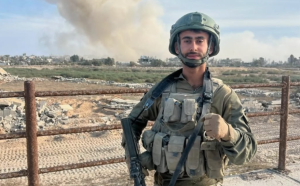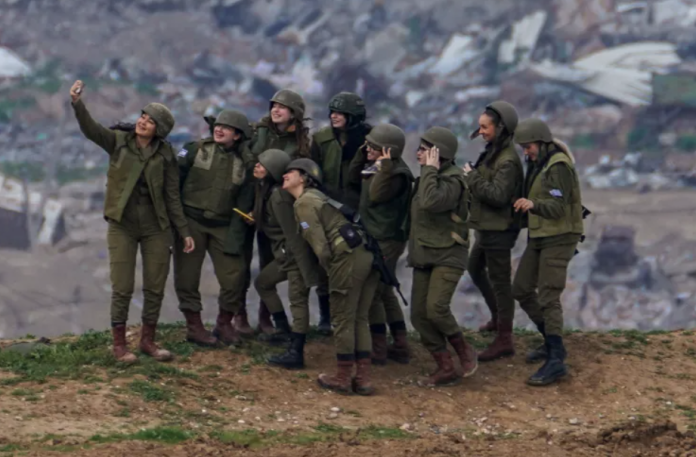The Hind Rajab Foundation is using Israeli soldiers’ own social media footage as evidence for war crimes investigations.
Israeli officials are concerned about their soldiers being arrested after fighting in Gaza after a soldier fled Brazil to avoid being questioned over alleged war crimes he committed in Gaza and filmed for social media.
The Belgium-based Hind Rajab Foundation (HRF) is the force behind this international effort for accountability.
Formed just five months ago, HRF has pulled together lawyers and activists from around the world to prepare cases, primarily based on social media content shared by Israeli soldiers themselves.
Israeli reservist Yuval Vagdani was among the first of what HRF founder and Chair Dyab Abou Jahjah says will be many soldiers accused of war crimes.
Speaking to the Israeli media on Wednesday after being “forced” to cut his “dream trip” to Brazil short, Vagdani said finding himself subject to an overseas war crimes investigation after having filmed himself blowing up people’s homes in Gaza “felt a little like a bullet in the heart”.
According to local media, Israel’s Ministry of Foreign Affairs had played a critical role in helping Vagdani evade investigation and potential prosecution for war crimes, first arranging for him to be smuggled into Argentina, and from there to the United States, before eventually leaving for Israel.
Israeli authorities and media have issued guidelines to soldiers on evading arrest overseas and camouflaging their identities while on deployment.
No response has been received to Al Jazeera’s query as to whether these extra measures include training for reservists on what might constitute a war crime.

Providing the evidence against them
After 15 months of Israeli soldiers proudly sharing videos of themselves committing potential war crimes in Gaza, HRF had plenty of evidence to use when seeking their prosecution under international and domestic law.
The videos and stills show soldiers forcing Palestinian men to parade in their underwear, abusing captives, looting and vandalising homes and even dressing up in women’s clothing they ransacked.
“This is about being accountable to the law,” Abou Jahjah said. “If individual soldiers feel they haven’t committed a war crime, that’s fine. Let’s hear their case. It’s in the interests of everyone to do so.”
Hind Rajab is the name of a five-year-old girl who was killed in a car in Gaza by Israel as she pleaded on the phone for three hours for help, surrounded by members of her dead family and in sight of the Palestinian paramedics who were also killed as they attempted to reach her.
So far, the foundation named after her has filed more than 1,000 cases to the international court.
HRF lawyers and online activists trawl through mountains of images and videos submitted to them online to verify and geolocate each one, check its metadata and verify its chain of custody, from the soldier filming it through to HRF, Abou Jahjah explained.
Where the perpetrator is a dual national, HRF seeks prosecution under the second country’s existing laws on war crimes and in the case of sole Israeli citizens, collate legal files, which are then filed as evidence with the International Criminal Court (ICC).
Predictably, HRF’s work has been met with fierce criticism in Israel, with some claiming that these legal procedures are “doxxing” (the unauthorised publication of individual identities) of soldiers who filmed themselves.
Abou Jahjah has also been personally threatened by Israeli Minister of Diaspora Affairs Amichai Chikli, who – alluding to the attacks on Hezbollah’s members’ communication systems in September 2024 – told him to “watch your pager”.
“I don’t really care,” Abou Jahjah said, “I’ve been at this for many years and, when you compare it to what’s happening in Gaza, threats against me don’t really amount to much.”
HRF also maintains a catalogue of what it describes as the “perpetrators, accomplices and inciters” it is seeking investigations against for war crimes.
Impunity and persecution
“They’re proud of these acts,” Milena Ansari of Human Rights Watch said from Jerusalem of the potential war crimes broadcast by soldiers across social media.
“Putting it online both adds to the dehumanisation of Palestinians as well as provides cause for actual celebration,” she told Al Jazeera.
“The sense of impunity is absolute … It’s always been there, especially with regard to Israeli actions in the occupied West Bank, but it’s increased significantly since October 2023 [when Israel’s war on Gaza began].”
Many in Israel regard the cases against reservists as unjust and a continuation of centuries of anti-Semitism, feelings claimed and weaponised by the Israeli state, political scientist Ori Goldberg said from Tel Aviv.
“Things are deteriorating within Israel,” Goldberg said. “You can’t engage in a genocide for 15 months and expect anything else. Israel has been fundamentally changed.
“People don’t regard Palestinians as even human now, if they ever really did. To most people, Palestinians aren’t even vermin. Vermin has to be killed. Palestinians are less than that,” he said.
In that context, a few soldiers “letting off steam” during a war that none feels responsible for, where the only victims were Palestinian, was understandable to many within Israel, Goldberg said
“They’re spinning this as the world against Israel,” Goldberg said of the government and media response to the numerous investigations and prosecutions thought to be under way.
“It’s the persecution of the Jews, all over again,” he said.
“Most people don’t even feel that Gaza has anything to do with them,” Goldberg continued, “On the one hand, we continue to bomb it, on the other, we feel we’re unaccountable for what goes on there.”






















